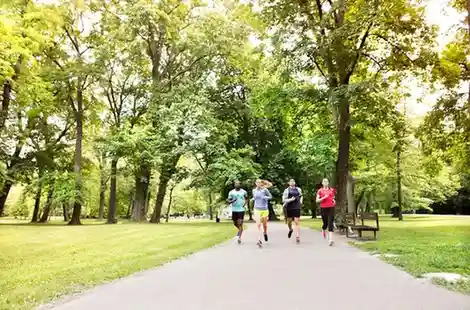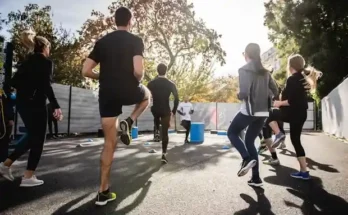Fitness isn’t just about six-pack abs or running the fastest mile. It’s a relationship—a deeply personal, ever-evolving connection between your body, your mind, and your will to grow. It’s a rhythm you learn to move to, not a finish line you sprint toward.
In a world flooded with fad diets, quick fixes, and picture-perfect bodies on social media, the true essence of fitness often gets buried. This article is not a checklist of workouts or a guide to the latest supplements. Instead, it’s a conversation—a dive into the soulful, sweaty, stubborn, and sometimes spiritual journey that is fitness.
The Meaning Behind Movement:
-
Fitness as a Lifestyle, Not a Destination
Too often, fitness is portrayed as a one-time goal. “Lose 20 pounds.” “Fit into that dress.” “Run that race.” But true fitness isn’t a temporary transformation; it’s a way of living. It’s how you choose to move, nourish, and honor your body day after day.
When fitness becomes a lifestyle, it evolves with you. It adapts to your seasons of life—your busy months, your low moments, your recoveries, and your breakthroughs. It becomes part of your identity, not just a number on the scale.
-
Listening to Your Body’s Language
The first step in any fitness journey is learning how to listen. Your body is constantly speaking to you—through soreness, fatigue, tightness, or bursts of energy. Fitness isn’t about pushing through pain at all costs. It’s about understanding the difference between discomfort that builds you and pain that breaks you.
Whether you’re lifting weights, practicing yoga, dancing, or simply walking more each day, fitness thrives when there’s mutual respect between you and your body. The more you listen, the more in sync you become.
The Mental Muscle:
-
Sweat and Sanity
It’s no secret that exercise boosts mental health. Endorphins, dopamine, serotonin—all those wonderful feel-good chemicals—are released when we move our bodies. But there’s something deeper at play.
Fitness teaches discipline. It teaches consistency. It creates a daily opportunity to show up for yourself, even when the world feels chaotic. That alone can be life-changing.
In times of stress, heartbreak, or uncertainty, the gym, the trail, or the mat can become a sacred space—a place where you’re reminded that you’re strong, capable, and resilient.
-
Confidence Through Capability
Confidence doesn’t come from what you look like—it comes from what you realize you can do. When you deadlift more than you thought you could, run farther than you believed possible, or touch your toes for the first time in years, your self-image begins to shift.
Fitness quietly transforms your narrative. You stop seeing yourself as someone who “can’t” and start believing you are someone who absolutely can.
Redefining Success in Fitness:
-
Breaking Free from Aesthetic Obsession
The fitness industry has long been obsessed with aesthetics. Flat stomachs. Toned arms. Thigh gaps. It’s a narrow, and often harmful, view of health. But real fitness isn’t always photogenic. It’s sweaty, messy, and deeply personal.
What if we measured fitness not by how we look, but by how we feel? More energy. Better sleep. Less anxiety. More confidence. A body that carries you joyfully through your life—that’s the true reward.
Shifting the focus from appearance to performance and well-being can liberate you from toxic comparison and unrealistic expectations.
-
Strength in Diversity
There is no one way to be fit. Fitness doesn’t have a size, shape, or age limit. Whether you’re a curvy runner, a senior lifter, a plus-sized yogi, or someone returning from injury, your fitness is valid.
Every journey is different. Everybody has a different rhythm. Celebrating that diversity makes fitness more inclusive, joyful, and sustainable for all.
Building a Relationship with Consistency:
-
Motivation vs. Discipline
Motivation is the spark, but discipline is the firewood. You won’t always want to work out. That’s okay. What matters is showing up anyway. Doing what you can with what you have. Building habits that become part of your day like brushing your teeth or drinking water.
Consistency doesn’t mean perfection. It means you keep coming back—especially after setbacks. Progress isn’t lost when you miss a workout. It’s lost when you quit altogether.
-
Designing a Life That Supports Movement
To be consistent, fitness has to fit you. That means finding activities you actually enjoy. Morning routines that make you feel alive. Friends or communities that hold you accountable. Environments that support your goals.
Fitness is not meant to be punishment. It should enhance your life, not complicate it. When you build your schedule around what you love to do, rather than trying to squeeze fitness in as an afterthought, it becomes effortless.
The Role of Nutrition:
-
Eating for Energy, Not Shame
Forget restrictive diets and shame-based eating. Fitness flourishes when nutrition becomes a form of self-respect. Food is fuel—not a reward, not a punishment.
Nourishing your body with whole foods, hydration, and balance helps you perform better, recover faster, and feel more energized. It’s not about being perfect with every meal. It’s about learning what makes you feel strong, satisfied, and supported.
-
Mindful Eating in a Noisy World
In a world of macros, calorie counters, and detox plans, it’s easy to forget how to just eat. Mindful eating is the practice of tuning in. Slowing down. Savoring. Honoring hunger and fullness cues.
When we treat food as a connection—connection to culture, to energy, to life—fitness becomes more holistic, and our relationship with food becomes one of joy, not judgment.
The Long Game:
-
Seasons of Movement
Your fitness journey will have seasons—times of intensity, times of rest. You might train for a marathon one year and do nothing but restorative yoga the next. That’s not failure. That’s the flow.
The key is to keep evolving. To adapt your routine to your needs. To remain curious. To let fitness age with you, grow with you, and guide you through life’s changes.
-
Passing the Torch
Fitness isn’t just personal—it’s generational. The habits you build, the lessons you learn, and the relationship you cultivate with your body can influence your family, your children, and your community.
When we model strength, health, and balance, we create ripples that extend far beyond ourselves.
Conclusion:
Fitness is not a trophy to earn. It’s a language your body speaks. A ritual your mind craves. A celebration of what it means to be alive in your own skin.
There will be setbacks. There will be plateaus. There will be days where your body resists and your mind wanders. But there will also be moments of pure joy—a sunrise run, a new personal record, a mirror that finally reflects not judgment, but pride.
In the end, fitness is about showing up for yourself—not just to change your body, but to change your life.




